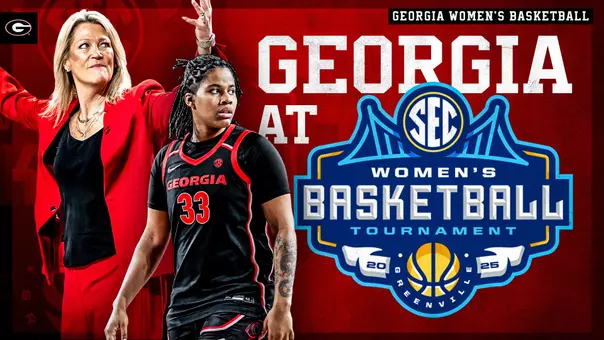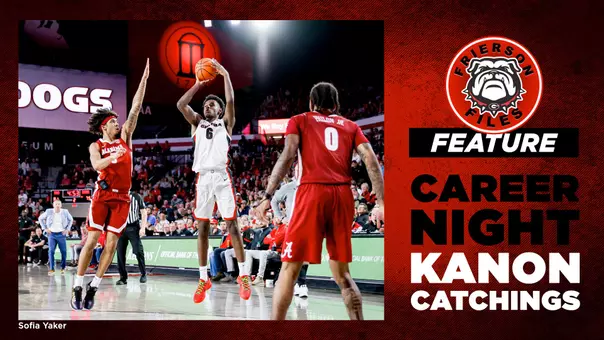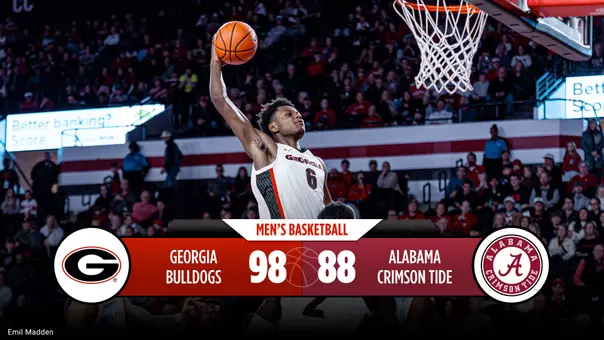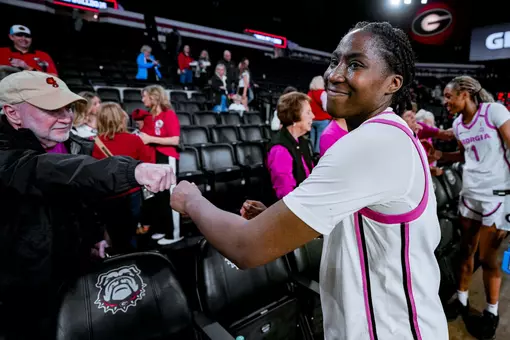University of Georgia Athletics
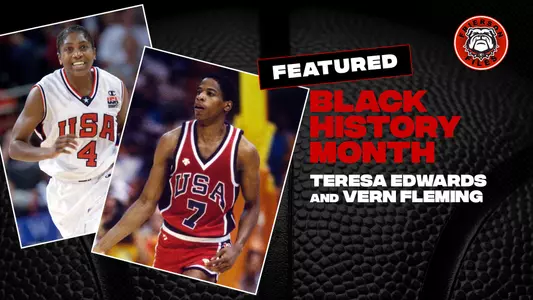
Edwards, Fleming Captured Gold In Los Angeles
February 16, 2024 | Men's Basketball, Women's Basketball, The Frierson Files
By John Frierson
Staff Writer
For Vern Fleming, it was an incredible, once-in-a-lifetime experience. For Teresa Edwards, it was an incredible, just-getting-started experience.
In late July, it will be 40 years since Fleming and Edwards, two of Georgia men's and women's basketball's all-time greats, suited up for the United States in the 1984 Summer Olympics in Los Angeles.
"That's quite a while," Fleming said with a laugh.
Their playing experiences on those teams were quite different — Fleming was in the starting lineup alongside guys like Michael Jordan and Patrick Ewing, while Edwards was the youngest player on a women's team led by Cheryl Miller and Lynette Woodard, and was among the last off the bench — but both left L.A. with gold medals and priceless memories.
"Being the youngest one on that team, and going through that process, it changed my life forever," said Edwards, now an author, speaker and coach in New York. "Every time I hear something about the Olympics, it's usually quite special, because it changed my whole life. It changed my outlook, it changed my perspective on athletics and sports and what elite-level athletes go through. ... I didn't know it could be so huge, and I didn't know I could represent something so big."
Georgia had produced a few Olympians before, most notably Forrest "Spec" Towns, the 1936 gold medalist in the 110-meter hurdles, but Edwards and Fleming were among the first Black current or former Georgia student-athletes to compete in the Olympics. Joining Fleming and Edwards in Los Angeles in 1984 were Lester Benjamin, who competed in the long jump for Antigua, and Norman Edwards, who won a silver medal in the 400-meter relay for Jamaica.
(Former sprinter Mel Lattany made the track and field team in 1980, but the U.S. ultimately boycotted the Games in Moscow.)
All U.S. Olympians were still amateurs in 1984, so the men's and women's basketball teams were a who's who of top college stars at that time. Along with Fleming, Jordan and Ewing, the men's team featured Sam Perkins, Chris Mullen, Steve Alford, Wayman Tisdale and more. The U.S. men cruised to the gold medal and wound up outscoring their opponents 763-506 over the eight games. Jordan was the star, of course, leading the team with 17.1 points per game.
"I think all of them were over probably by halftime," Fleming said of the games.
Fleming was a starter and a favorite of coach Bobby Knight because of his defense and basketball IQ, and because the fiery Knight liked Fleming, his teammates called him "the teacher's pet," Fleming recalled with a laugh. He averaged 7.7 points, 2.7 rebounds, 2.7 assists and 1.3 steals per game.
"My uniform, my jersey and shorts, my home and away ones, are up in a trophy room I've got in my house, with the gold medal," said Fleming, who lives in Indianapolis, where he starred for the Pacers during his long NBA career.
He played 11 seasons with the Pacers, and wrapped up his career with the New Jersey Nets in 1996. In 893 career games, he averaged 11.3 points, shot 49.8% from the field, dished out 4.8 assists and grabbed 3.4 rebounds a game.
Fleming scored 1,777 points for Georgia (1981-84), which still ranks fourth on the all-time list. As a junior, he averaged 16.9 points per game during Final Four season in 1983, And in his final season, his scoring ramped up to 19.8 per game. In addition, his 205 career steals rank fourth and his 400 assists are tied for sixth.
"To see him going to the Olympics, it just solidified all the things that we saw in him as a player at Georgia. It also solidified the fact that he always worked hard. He just wanted to win, that's all he wanted to do," said Georgia teammate Derrick Floyd.
On the women's team, Miller led the way with 16.5 points and 7.0 rebounds a game, while Woodard averaged 10.5 points and 4.0 rebounds. Edwards, just 20 years old at the time, averaged 2.5 points, 2.0 rebounds, 1.3 assists and 1.2 steals a game. That she was there at all was due to Georgia coach Andy Landers' insistence that she attend the Olympic Trials.
According to Landers, Georgia's Hall of Fame coach from 1979-2015, Edwards came to him one day after receiving an invitation to the Trials, and said she didn't think she was going to go. She was already an All-American at that point, but she didn't think she could beat out so many great players to make the team. Landers disagreed.
Landers challenged her to name five guards in the country that Edwards thought were better than her. She named a couple, Landers recalled back in 2020, but then "she started thinking about it and stuttered a little bit.
"I said, 'OK, that's it.' I said, 'You're going to try out for this team.' I said, 'You're going to make it because you can't name five that you think are better than you are.'"
And he was right. And while she didn't light up the scoreboard in 1984, her days of Olympic stardom were still to come. In 1988, playing alongside fellow Bulldog legend Katrina McClain, Edwards helped the U.S. team capture gold in the Seoul Games, averaging 16.6 points and 3.4 assists per game. McClain, meanwhile. averaged 17.6 points and 10.4 rebounds. (On the U.S. men's team in 1988 was former Bulldog great Willie Anderson.)
Four years later, in Barcelona, Edwards averaged 12.6 points and 5.4 assists, helping the Americans earn the bronze medal. In 1996, at the Atlanta Games only a few hours from her hometown of Cairo, Edwards was given the honor of reading the Athlete's Oath during the opening ceremony. And once play began, she averaged 6.9 points and 7.2 assists while helping the U.S. win gold.
"The was huge," said Edwards, who led the Lady Bulldogs to two Final Fours and whose 653 career assists from 1982-86 are still No. 1 all-time at Georgia, and her 1,989 career points rank sixth.
The 2000 Olympics in Sydney were Edwards' fifth and final Games. No longer the 20-year-old youngster on the team, Edwards was the 36-year-old legend by then, and she still averaged 6.1 points and 3.4 assists a game — and she earned her fourth gold medal.
In looking back at the top 100 female athletes of the 20th century, Sports Illustrated, in 2000, ranked Edwards No. 22. In 2010, she was inducted into the Women's Basketball Hall of Fame. Three years later, she was inducted into the FIBA Hall of Fame. She's one of the greatest and most accomplished international basketball players of all time, and it started with Landers convincing her to go for a spot in Los Angeles in 1984.
"Coach was the right man, chosen at the right time, to make that moment happen for me," Edwards said in 2020, "because I would not have come close to being a five-time Olympian if we hadn't had that conversation."
Staff Writer
For Vern Fleming, it was an incredible, once-in-a-lifetime experience. For Teresa Edwards, it was an incredible, just-getting-started experience.
In late July, it will be 40 years since Fleming and Edwards, two of Georgia men's and women's basketball's all-time greats, suited up for the United States in the 1984 Summer Olympics in Los Angeles.
"That's quite a while," Fleming said with a laugh.
Their playing experiences on those teams were quite different — Fleming was in the starting lineup alongside guys like Michael Jordan and Patrick Ewing, while Edwards was the youngest player on a women's team led by Cheryl Miller and Lynette Woodard, and was among the last off the bench — but both left L.A. with gold medals and priceless memories.
"Being the youngest one on that team, and going through that process, it changed my life forever," said Edwards, now an author, speaker and coach in New York. "Every time I hear something about the Olympics, it's usually quite special, because it changed my whole life. It changed my outlook, it changed my perspective on athletics and sports and what elite-level athletes go through. ... I didn't know it could be so huge, and I didn't know I could represent something so big."
Georgia had produced a few Olympians before, most notably Forrest "Spec" Towns, the 1936 gold medalist in the 110-meter hurdles, but Edwards and Fleming were among the first Black current or former Georgia student-athletes to compete in the Olympics. Joining Fleming and Edwards in Los Angeles in 1984 were Lester Benjamin, who competed in the long jump for Antigua, and Norman Edwards, who won a silver medal in the 400-meter relay for Jamaica.
(Former sprinter Mel Lattany made the track and field team in 1980, but the U.S. ultimately boycotted the Games in Moscow.)
All U.S. Olympians were still amateurs in 1984, so the men's and women's basketball teams were a who's who of top college stars at that time. Along with Fleming, Jordan and Ewing, the men's team featured Sam Perkins, Chris Mullen, Steve Alford, Wayman Tisdale and more. The U.S. men cruised to the gold medal and wound up outscoring their opponents 763-506 over the eight games. Jordan was the star, of course, leading the team with 17.1 points per game.
"I think all of them were over probably by halftime," Fleming said of the games.
Fleming was a starter and a favorite of coach Bobby Knight because of his defense and basketball IQ, and because the fiery Knight liked Fleming, his teammates called him "the teacher's pet," Fleming recalled with a laugh. He averaged 7.7 points, 2.7 rebounds, 2.7 assists and 1.3 steals per game.
"My uniform, my jersey and shorts, my home and away ones, are up in a trophy room I've got in my house, with the gold medal," said Fleming, who lives in Indianapolis, where he starred for the Pacers during his long NBA career.
He played 11 seasons with the Pacers, and wrapped up his career with the New Jersey Nets in 1996. In 893 career games, he averaged 11.3 points, shot 49.8% from the field, dished out 4.8 assists and grabbed 3.4 rebounds a game.
Fleming scored 1,777 points for Georgia (1981-84), which still ranks fourth on the all-time list. As a junior, he averaged 16.9 points per game during Final Four season in 1983, And in his final season, his scoring ramped up to 19.8 per game. In addition, his 205 career steals rank fourth and his 400 assists are tied for sixth.
"To see him going to the Olympics, it just solidified all the things that we saw in him as a player at Georgia. It also solidified the fact that he always worked hard. He just wanted to win, that's all he wanted to do," said Georgia teammate Derrick Floyd.
On the women's team, Miller led the way with 16.5 points and 7.0 rebounds a game, while Woodard averaged 10.5 points and 4.0 rebounds. Edwards, just 20 years old at the time, averaged 2.5 points, 2.0 rebounds, 1.3 assists and 1.2 steals a game. That she was there at all was due to Georgia coach Andy Landers' insistence that she attend the Olympic Trials.
According to Landers, Georgia's Hall of Fame coach from 1979-2015, Edwards came to him one day after receiving an invitation to the Trials, and said she didn't think she was going to go. She was already an All-American at that point, but she didn't think she could beat out so many great players to make the team. Landers disagreed.
Landers challenged her to name five guards in the country that Edwards thought were better than her. She named a couple, Landers recalled back in 2020, but then "she started thinking about it and stuttered a little bit.
"I said, 'OK, that's it.' I said, 'You're going to try out for this team.' I said, 'You're going to make it because you can't name five that you think are better than you are.'"
And he was right. And while she didn't light up the scoreboard in 1984, her days of Olympic stardom were still to come. In 1988, playing alongside fellow Bulldog legend Katrina McClain, Edwards helped the U.S. team capture gold in the Seoul Games, averaging 16.6 points and 3.4 assists per game. McClain, meanwhile. averaged 17.6 points and 10.4 rebounds. (On the U.S. men's team in 1988 was former Bulldog great Willie Anderson.)
Four years later, in Barcelona, Edwards averaged 12.6 points and 5.4 assists, helping the Americans earn the bronze medal. In 1996, at the Atlanta Games only a few hours from her hometown of Cairo, Edwards was given the honor of reading the Athlete's Oath during the opening ceremony. And once play began, she averaged 6.9 points and 7.2 assists while helping the U.S. win gold.
"The was huge," said Edwards, who led the Lady Bulldogs to two Final Fours and whose 653 career assists from 1982-86 are still No. 1 all-time at Georgia, and her 1,989 career points rank sixth.
The 2000 Olympics in Sydney were Edwards' fifth and final Games. No longer the 20-year-old youngster on the team, Edwards was the 36-year-old legend by then, and she still averaged 6.1 points and 3.4 assists a game — and she earned her fourth gold medal.
In looking back at the top 100 female athletes of the 20th century, Sports Illustrated, in 2000, ranked Edwards No. 22. In 2010, she was inducted into the Women's Basketball Hall of Fame. Three years later, she was inducted into the FIBA Hall of Fame. She's one of the greatest and most accomplished international basketball players of all time, and it started with Landers convincing her to go for a spot in Los Angeles in 1984.
"Coach was the right man, chosen at the right time, to make that moment happen for me," Edwards said in 2020, "because I would not have come close to being a five-time Olympian if we hadn't had that conversation."
Assistant Sports Communications Director John Frierson is the staff writer for the UGA Athletic Association and curator of the ITA Men's Tennis Hall of Fame. You can find his work at: Frierson Files. He's also on Twitter: @FriersonFiles and @ITAHallofFame.
Georgia Men's Basketball _ Marcus "Smurf" Millender and Kanon Catchings Post Game Press Conference vs Alabama
Tuesday, March 03
Georgia Men's Basketball vs Alabama - TV Highlights
Tuesday, March 03
Georgia Men's Basketball - Head Coach Mike White Postgame Press Conference vs Alabama
Tuesday, March 03
Georgia Men's Basketball- Jeremiah Wilkinson and Jake Wilkins Post Game Press Conference vs South Carolina
Saturday, February 28

